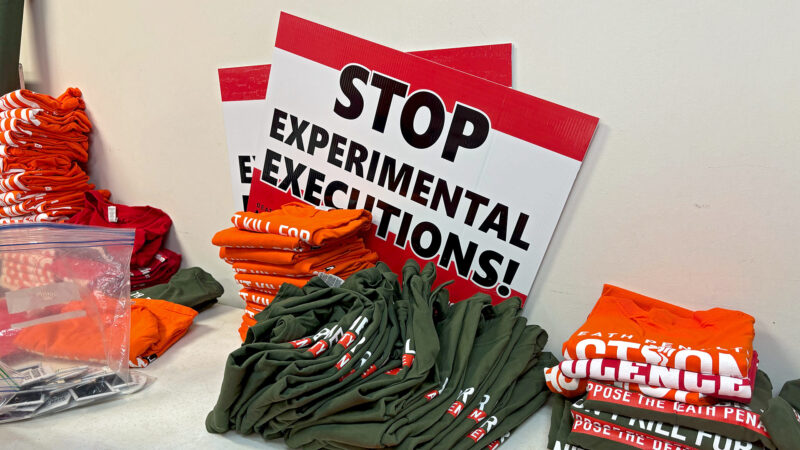Ahead of Kenneth Smith’s execution, people impacted by Alabama’s death penalty speak out
Signs and t-shirts handed out by Death Penalty Action sit on a table inside the Unitarian Universalist Church in Birmingham, Alabama, on Wednesday, Jan. 24, 2024. The nonprofit organization held an event in protest of the scheduled execution of Kenneth Eugene Smith on Thursday, featuring guest speakers impacted by Alabama Death Row.
Protestors have rallied throughout Alabama in advance of the state’s plans to execute a convicted murderer using an untested method. The night before the scheduled execution of Kenneth Eugene Smith, the Unitarian Universalist Church in Birmingham opened its doors to Death Penalty Action, a nonprofit that works to stop executions and abolish the death penalty.
The group handed out yard signs, t-shirts and buttons with messages opposing the death penalty to the dozen people gathered in the church basement to hear directly from people who have been affected by the death penalty.
“Every time something like this happens and it gets a lot of attention, more people come to the realization that the death penalty is a failed public policy,” said Abraham Bonowitz, Death Penalty Action’s executive director. “It doesn’t serve us well and we can be safe from dangerous offenders and hold them accountable without executions.”
Chris Brown attended to speak on the impact death row has on family members. His father sat on death row in Alabama for almost 17 years before he was executed in 2003.
“I grew up with him on death row and after his execution, I stayed as active as I could in the movement,” Brown said. He now works with Death Penalty Action to spread the message that the death penalty is barbaric — especially with this method.
Alabama will be the first state in the United States to use nitrogen hypoxia — using a gas mask to replace air with nitrogen and cause suffocation — in an execution. Mississippi and Oklahoma have also approved its use for future executions.
Alabama officials have called it “painless” and “humane,” but some doctors and critics have concerns.
“For me, as a Christian,” Brown said, “I believe that all life is precious and I believe that any execution is wrong.”
Smith, who has been on death row for nearly 28 years for the murder of a woman in 1988, is scheduled to be executed after 6 p.m. on Thursday. So far, courts have denied appeals to halt the execution.
Gary Drinkard, a former Alabama Death Row inmate whose conviction was overturned on appeal in 2001, attended the rally and spoke about his relationship with Smith.
“I met Kenny when I was on death row,” he said. “He would help anyone he could. He was a born-again Christian.”
Drinkard also described the emotional toll an execution would take on other incarcerated people on death row. Those still incarcerated would wear all white in honor of the person being executed on the day before and the day after their execution.
He also recalled how prisoners would bang on their cells during an execution to let the executed person know they were thinking of them in their last moments. The sound of that clanging, he said, still lingers in his nightmares.
The state previously attempted execution by lethal injection in 2022, but it was called off after workers were unable to insert the needles used for the injection into his veins.
“To expect them to be able to be competent in carrying out an execution is just absolutely foolish,” Brown said.
Gulf States Newsroom Managing Editor Priska Neely contributed to this report.
This story was produced by the Gulf States Newsroom, a collaboration between Mississippi Public Broadcasting, WBHM in Alabama, WWNO and WRKF in Louisiana and NPR.
Mideast clashes breach Olympic truce as athletes gather for Winter Paralympic Games
Fighting intensified in the Middle East during the Olympic truce, in effect through March 15. Flights are being disrupted as athletes and families converge on Italy for the Winter Paralympics.
A U.S. scholarship thrills a teacher in India. Then came the soul-crushing questions
She was thrilled to become the first teacher from a government-sponsored school in India to get a Fulbright exchange award to learn from U.S. schools. People asked two questions that clouded her joy.
Sunday Puzzle: Sandwiched
NPR's Ayesha Rascoe plays the puzzle with WXXI listener Jonathan Black and Weekend Edition Puzzlemaster Will Shortz.
U.S.-Israeli strikes in Iran continue into 2nd day, as the region faces turmoil
Israel said on Sunday it had launched more attacks on Iran, while the Iranian government continued strikes on Israel and on U.S. targets in Gulf states, Iraq and Jordan.
Trump warns Iran not to retaliate after Ayatollah Ali Khamenei is killed
The Iranian government has announced 40 days of mourning. The country's supreme leader was killed following an attack launched by the U.S. and Israel on Saturday against Iran.
Iran fires missiles at Israel and Gulf states after U.S.-Israeli strike kills Khamenei
Iran fired missiles at targets in Israel and Gulf Arab states Sunday after vowing massive retaliation for the killing of Supreme Leader Ayatollah Ali Khamenei by the United States and Israel.








